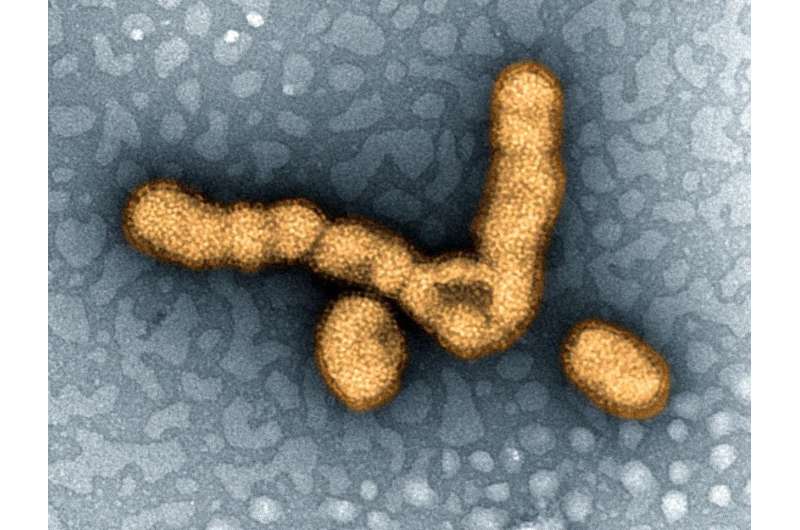H1N1 influenza virus particles. Credit: NIAID
A team of researchers from the University of Pennsylvania, the University of Pittsburgh, Centro Nacional de Diagnóstico y Referencia, Nicaragua, and the University of Michigan has found that the strains of influenza virus that infect people when they are young may influence their susceptibility to other influenza strains later in life. In their paper published in Proceedings of the National Academy of Sciences, the group describes their study of influenza strains in ferrets and human blood samples and what they found.
As the researchers note, most people are first infected with an influenza virus at age five, when they first go to school. Thereafter, most people are exposed to and are infected by several influenza viruses throughout their lifetimes. Prior research has shown that the antibody response by an individual person to a specific influenza virus can be boosted by infections by other strains. In this new effort, the researchers sought to find out if the strain of influenza that infects a person early in their life might affect their ability to fight off other strains later in life. To find out, they conducted tests with two well-known strains of influenza, lab ferrets and human blood.
The experiments involved infecting ferrets or blood samples with one strain of an influenza virus and then attempting to infect them again with another strain—and also attempting to infect blood samples from people who had already had one or the other types of infection earlier in their life.
The researchers found that if a person was infected with H1N1, (the strain of influenza behind the 2009 pandemic), antigens in the blood would successfully fight off the H3N2 strain. The reverse was not true, however. A person infected with H3N2 as a child saw no increased protection against H1N1. These results led the researchers to conclude that the specific type of flu a child acquires may affect their susceptibility to other strains when they grow older. They suggest that infections during childhood result in the development of a memory immune response—the basis behind what has come to be known as "Original Antigenic Sin."
More information: Claudia P. Arevalo et al. Original antigenic sin priming of influenza virus hemagglutinin stalk antibodies, Proceedings of the National Academy of Sciences (2020). DOI: 10.1073/pnas.1920321117
Journal information: Proceedings of the National Academy of Sciences
© 2020 Science X Network
























